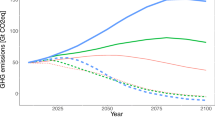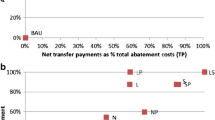Abstract
This paper analyzes the regional distribution of climate change mitigation costs in a global cap-and-trade regime. Four stylized burden-sharing rules are considered, ranging from GDP-based permit allocations to schemes that foresee a long-term convergence of per-capita emission permits. The comparison of results from three structurally different hybrid, integrated energy-economy models allows us to derive robust insights as well as identify sources of uncertainty with respect to the regional distribution of the costs of climate change mitigation. We find that regional costs of climate change mitigation may deviate substantially from the global mean. For all models, the mitigation cost average of the four scenarios is higher for China than for the other macro-regions considered. Furthermore, China suffers above-world-average mitigation costs for most burden-sharing rules in the long-term. A decomposition of mitigation costs into (a) primary (domestic) abatement costs and (b) permit trade effects, reveals that the large uncertainty about the future development of carbon prices results in substantial uncertainties about the financial transfers associated with carbon trade for a given allocation scheme. This variation also implies large uncertainty about the regional distribution of climate policy costs.








Similar content being viewed by others
Notes
Both consumption losses and carbon trade costs are discounted at 5 % p.a.
Abbreviations
- IPCC:
-
Intergovernmental panel on climate change
- SAR:
-
Second assessment report of the IPCC
- TAR:
-
Third assessment report of the IPCC
- RECIPE:
-
Report on energy and climate policy in Europe
References
Bauer N, Baumstark L, Leimbach M (2011) The REMIND-R model: the role of renewables in the low-carbon transformation. Clim Change, this issue
Bosetti V, Carraro C, Galeotti M, Massetti E, Tavoni M (2006) WITCH: a world induced technical change hybrid model. Energ J 27(Special Issue 2):13–38
Bosetti V, Carraro C, Galeotti, Massetti E, Tavoni M (2007) The WITCH model: structure, baseline and solution. FEEM Working Paper N. 10.2007, Milan
Clarke L, Edmonds J, Krey V, Richels R, Rose S, Tavoni M (2009) International climate policy architectures: overview of the EMF22 international scenarios. Energ Econ 31:S64–S81
Coase R (1960) The problem of social cost. J Law Econ 3:1–44
Crassous R, Hourcarde JC, Sassi O (2006) Endogenous structural change and climate targets modeling experiments with IMACLIM-R. Energ J 27:259–276
De Cian E, Bosetti V, Tavoni M (2011) Technology innovation and diffusion in ‘less than ideal’ climate policies: an assessment with the WITCH model. Clim Chang. doi:10.1007/s10584-011-0320-5
den Elzen M, Höhne N (2008) Reductions of greenhouse gas emissions in Annex I and non-Annex I countries for meeting concentration stabilisation targets. Clim Chang 91(3–4):249–274. doi:10.1007/s10584-008-9484-z
den Elzen MGJ, Lucas PL, van Vuuren DP (2008) Regional abatement action and costs under allocation schemes for emission allowances for achieving low CO2-equivalent concentrations. Clim Chang 90(3):243–268. doi:10.1007/s10584-008-9466-1
Fisher BS, Barrett S, Bohm P, Kuroda M, Mubazi JKE, Shah A, Stavins RN (1996) An economic assessment of policy instruments for combatting climate change. In: Bruce PJ, Lee H, Haites EF (eds) Climate change 1995. Economic and social dimensions of climate change. Contribution of working group III to the second assessment report of the intergovernmental panel on climate change. Cambridge University Press, Cambridge
Fisher BS, Nakicenovic N et al (2007) Issues related to mitigation in the long term context. In: Metz B, Davidson OR, Bosch PR, Dave R, Meyer LA (eds) Climate change 2007: mitigation. Contribution of working group III to the fourth assessment report of the inter-governmental panel on climate change. Cambridge University Press, Cambridge, United Kingdom and New York, NY, USA
Gupta S, Tirpak DA et al (2007) Policies, instruments, and co-operative arrangements. In: Metz B, Davidson OR, Bosch PR, Dave R, Meyer LA (eds) Climate change 2007: mitigation. Contribution of working group III to the fourth assessment report of the inter-governmental panel on climate change. Cambridge University Press, Cambridge, United Kingdom and New York, NY, USA
Hof AF, den Elzen MGJ, van Vuuren DP (2008) Environmental effectiveness and economic consequences of fragmented versus universal regimes: what can we learn from model studies? Int Environ Agreements Polit Law Econ 9(1):39–62. doi:10.1007/s10784-008-9087-1
Höhne N, den Elzen MGJ, Weiss M (2006) Common but differentiated convergence (CDC), a new conceptual approach to long-term climate policy. Clim Pol 6(2):181–199
Hourcade JC et al (1996) A review of mitigation cost studies. In: Bruce PJ, Lee H, Haites EF (eds) Climate change 1995. Economic and social dimensions of climate change. Contribution of working group III to the second assessment report of the intergovernmental panel on climate change. Cambridge University Press, Cambridge
Hourcade JC, Shukla PR et al (2001) Global, regional, and national costs and ancillary benefits of mitigation. In: Metz B, Davidson O, Swart R, Pan J (eds) Climate change 2001—mitigation. Contribution of working group III to the third assessment report of the intergovernmental panel on climate change. Cambridge University Press, Cambridge
Jakob M, Bosetti V, Weisman H, De Cian E, Steckel J, Leimbach M, Baumstark L (2009a) The RECIPE reference scenarios. RECIPE Background Paper, Potsdam Institute for Climate Impact Research. Available online at http://www.pik-potsdam.de/recipe
Jakob M, Waisman H, Bosetti V, De Cian E, Leimbach M, Baumstark L, Luderer G (2009b) Description of the RECIPE models. RECIPE Background Paper, Potsdam Institute for Climate Impact Research. Available online at http://www.pik-potsdam.de/recipe
Jakob M, Luderer G, Steckel J, Bosetti V, Tavoni M, Waisman H (2010) Time to act now? assessing the costs of delaying climate measures and benefits of early action. Clim Change, this issue, doi:10.1007/s10584-011-0128-3
Leimbach M, Bauer N, Baumstark L, Edenhofer O (2010a) Mitigation costs in a globalized world: climate policy analysis with REMIND-R. Environ Model Assess 15(3):155–173. doi:10.1007/s10666-009-9204-8
Leimbach M, Bauer N, Baumstark L, Lüken M, Edenhofer O (2010b) Technological change and international trade–insights from REMIND-R. Energ J 31:109–136
Luderer G, Bosetti V, Jakob M, Leimbach M, Edenhofer O (2011) The economics of decarbonizing the energy system: results and insights from the RECIPE model intercomparison. Clim Change, this issue
Lüken M, Edenhofer O, Knopf B, Leimbach M, Luderer G, Bauer N (2011) The role of technological availability for the distributive impacts of climate change mitigation policy. Energ Pol 39(10):6030–6039
Manne AS, Stephan G (2005) Global climate change and the equity-efficiency puzzle. Energy 30:2525–2536
Meinshausen M, Meinshausen N, Hare W, Raper SCB, Frieler K, Knutti R, Frame DJ, Allen MR (2009) Greenhouse-gas emission targets for limiting global warming to 2 °C. Nature 458(7242):1158–1162
Meyer A (2000) Contraction & convergence. The global solution to climate change. Schumacher Briefings, 5. Green Books, Bristol, UK. http://www.gci.org.uk/Briefings/ICE.pdf
Rogelj J, Nabel J, Chen C, Hare W, Markmann K, Meinshausen M, Schaeffer M, Macey K, Hohne N (2010) “Copenhagen accord pledges are paltry.” Nature 464(7292) (April 22): 1126–1128. doi:10.1038/4641126a
Rose A, Stevens B, Edmonds J, Wise M (1998) International equity and differentiation in global warming policy. An application to tradable emission permits. Environ Resour Econ 12:25–51
Sassi O, Crassous R, Hourcade JC, Gitz V, Waisman H, Guivarch C (2010) IMACLIM-R: a modelling framework to simulate sustainable development pathways. Int J Glob Environ Issues 10:5–24
Stern N (2006) The economics of climate change—the stern review. Cambridge University Press, New York
Tavoni M, et al. (2011) Technology option values and technological change towards a low carbon economy. Clim Change, this issue
Waisman H, Guivarch C, Grazi F, Hourcade JC (2011) The IMACLIM-R model: infrastructures, technical inertia and the costs of low carbon futures under imperfect foresight. Clim Change, this issue
WBGU (2009) Solving the climate dilemma: the budget approach. Special Report, Wissenschaftlicher Beirat Globale Umweltveränderungen, Berlin, Germany. Available online at http://www.wbgu.de/wbgu_sn2009_en.pdf
Acknowledgments
The authors would like to thank Christian Flachsland as well as the anonymous reviewers for their valuable comments on earlier versions of this manuscript. The RECIPE project was funded by Allianz and WWF Europe.
Author information
Authors and Affiliations
Corresponding author
Rights and permissions
About this article
Cite this article
Luderer, G., DeCian, E., Hourcade, JC. et al. On the regional distribution of mitigation costs in a global cap-and-trade regime. Climatic Change 114, 59–78 (2012). https://doi.org/10.1007/s10584-012-0408-6
Received:
Accepted:
Published:
Issue Date:
DOI: https://doi.org/10.1007/s10584-012-0408-6




